Engerman S.L., Gallman R.E. The Cambridge Economic History of the United States, Vol. 1: The Colonial Era
Подождите немного. Документ загружается.


The
Revolution,
Constitution,
and New Nation 387
ence in the slave trade to 1808; on August 28, they agreed not to permit
export duties by the states, although on September 13, they settled on the
principle that a state might levy "incidental duties necessary for the inspec-
tion & safekeeping" of
exports.
In effect, delegates had created a written
structure that recognized the rift between North and South that had
developed over the colonial and Revolutionary periods.
6
With respect to internal improvements and manufacturing, Convention
committees charged with considering these issues never reported back to
the whole delegation, probably out of fear that specific proposals for
development would jeopardize intersectional harmony. Some delegates
privately admitted that different parts of the country would benefit un-
equally from improved transportation links among frontier settlements.
Others worried about the interregional conflicts resulting from measures
fostering manufactures. The idea that the new union might serve these
diverse, sometimes conflicting interests was crucial to its appeal. Equally
crucial was its ability to avoid express commitments that showed a re-
gional bias. Along the same lines, the Convention delegates hesitated to
give Congress specific authority to issue paper currency, even as they
prevented state emissions in the future. The prospects of assuming state
debts and eradicating the dilemma of depreciating paper currencies came
up only briefly. Delegates also explicitly excluded sumptuary legislation
from the powers of the federal government, and they limited monopoly
rights to patents and copyrights.
As Nationalists - identified after 1787 as Federalists - sought ratifica-
tion of the Constitution, their opponents rallied. Antifederalists were not
convinced that the Constitution was a truly representative or federal pro-
posal, and they opposed
its.
economic provisions in every major particular.
Especially when contemplating whether the new settlements of the West
would favor economic and cultural exchange with the North or South,
they feared deepening sectional divisions. Other opponents challenged the
right of delegates to destroy the sovereign powers of the states and give
them to the new Federal government. Tax powers would be shared be-
tween federal and state authorities in the future, and uniform import
duties threatened to eradicate the states' control over their commerce.
They feared Federalists would resort to excise taxes - a fear proved correct
in 1791 - and they predicted that a federal Congress would sooner or later
6
James Madison Notes, and George Mason Speech, Sept. 13, Sept. 15, 1787, The
Records
of the
Federal Convention
0/1787, ed. Max Far rand, 4 vols. (New Haven, CT, 19x1; repr. 1966), 2:60;,
631.
Cambridge Histories Online © Cambridge University Press, 2008
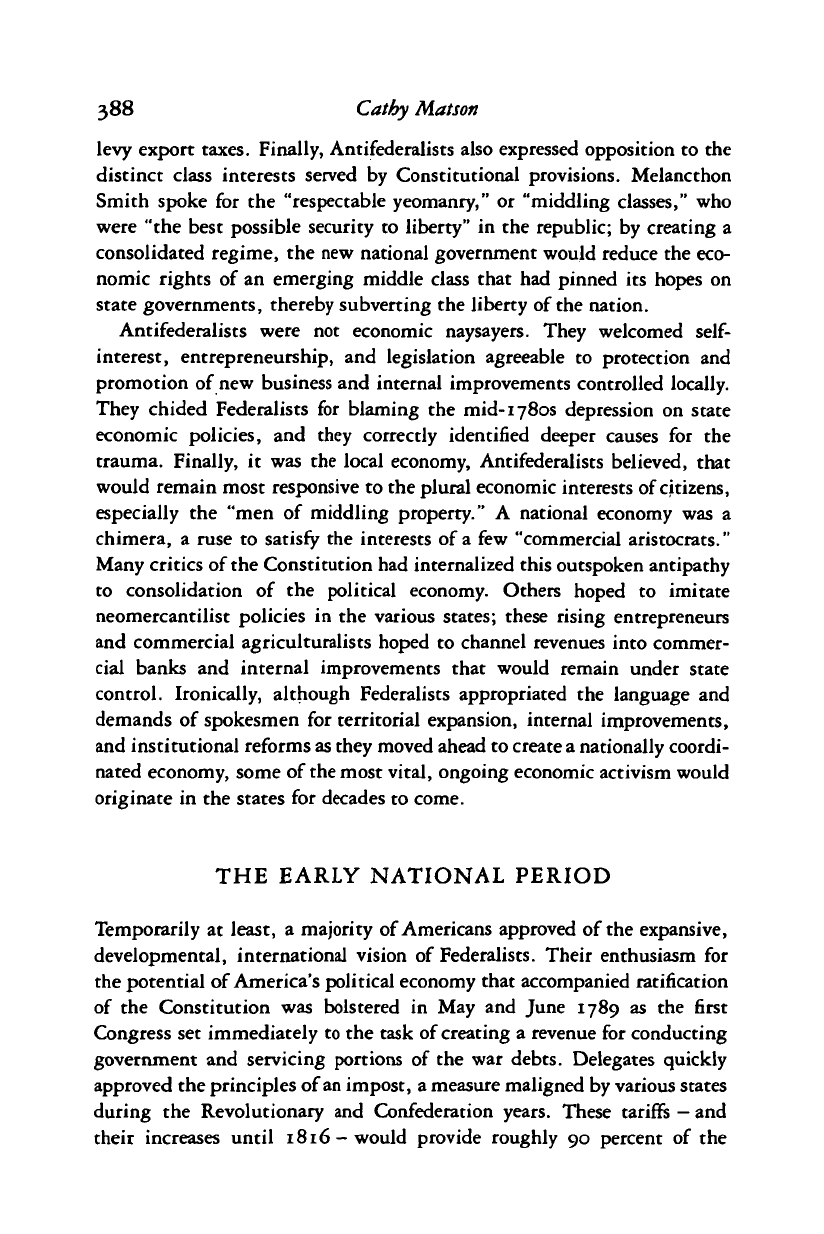
388 Cathy Matson
levy export taxes. Finally, Antifederalists also expressed opposition to the
distinct class interests served by Constitutional provisions. Melancthon
Smith spoke for the "respectable yeomanry," or "middling classes," who
were "the best possible security to liberty" in the republic; by creating a
consolidated regime, the new national government would reduce the eco-
nomic rights of an emerging middle class that had pinned its hopes on
state governments, thereby subverting the liberty of
the
nation.
Antifederalists were not economic naysayers. They welcomed
self-
interest, entrepreneurship, and legislation agreeable to protection and
promotion of new business and internal improvements controlled locally.
They chided Federalists for blaming the mid-1780s depression on state
economic policies, and they correctly identified deeper causes for the
trauma. Finally, it was the local economy, Antifederalists believed, that
would remain most responsive to the plural economic interests of citizens,
especially the "men of middling property." A national economy was a
chimera, a ruse to satisfy the interests of a few "commercial aristocrats."
Many critics of the Constitution had internalized this outspoken antipathy
to consolidation of the political economy. Others hoped to imitate
neomercantilist policies in the various states; these rising entrepreneurs
and commercial agriculturalists hoped to channel revenues into commer-
cial banks and internal improvements that would remain under state
control. Ironically, although Federalists appropriated the language and
demands of spokesmen for territorial expansion, internal improvements,
and institutional reforms as they moved ahead to create a nationally coordi-
nated economy, some of
the
most vital, ongoing economic activism would
originate in the states for decades to come.
THE EARLY NATIONAL PERIOD
Temporarily at least, a majority of Americans approved of the expansive,
developmental, international vision of Federalists. Their enthusiasm for
the potential of America's political economy that accompanied ratification
of the Constitution was bolstered in May and June 1789 as the first
Congress set immediately to the task of creating a revenue for conducting
government and servicing portions of the war debts. Delegates quickly
approved the principles of an impost, a measure maligned by various states
during the Revolutionary and Confederation years. These tariffs
—
and
their increases until 1816- would provide roughly 90 percent of the
Cambridge Histories Online © Cambridge University Press, 2008
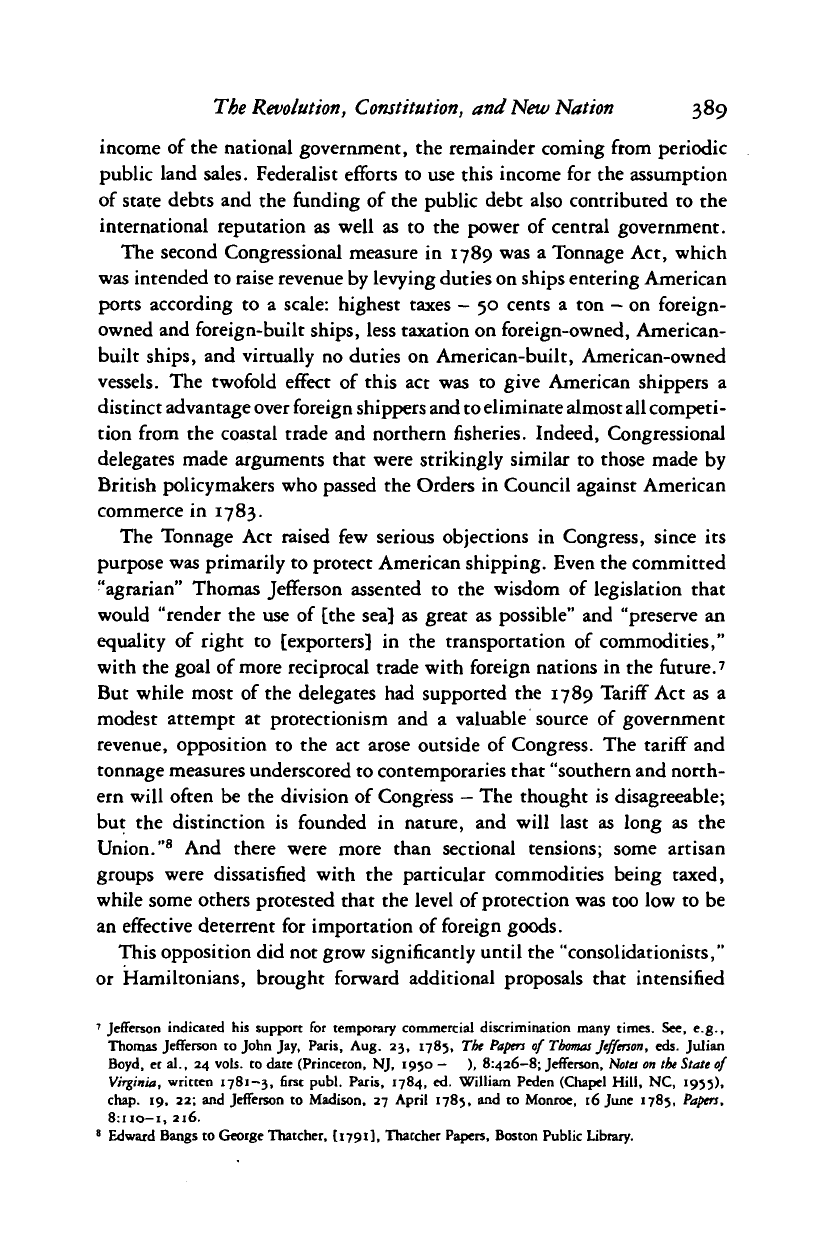
The
Revolution,
Constitution,
and New Nation 389
income of the national government, the remainder coming from periodic
public land sales. Federalist efforts to use this income for the assumption
of state debts and the funding of the public debt also contributed to the
international reputation as well as to the power of central government.
The second Congressional measure in 1789 was a Tonnage Act, which
was intended to raise revenue by levying duties on ships entering American
ports according to a scale: highest taxes
—
50 cents a ton
—
on foreign-
owned and foreign-built ships, less taxation on foreign-owned, American-
built ships, and virtually no duties on American-built, American-owned
vessels. The twofold effect of this act was to give American shippers a
distinct advantage over foreign shippers and to eliminate almost
all
competi-
tion from the coastal trade and northern fisheries. Indeed, Congressional
delegates made arguments that were strikingly similar to those made by
British policymakers who passed the Orders in Council against American
commerce in 1783.
The Tonnage Act raised few serious objections in Congress, since its
purpose was primarily to protect American shipping. Even the committed
"agrarian" Thomas Jefferson assented to the wisdom of legislation that
would "render the use of [the sea] as great as possible" and "preserve an
equality of right to [exporters] in the transportation of commodities,"
with the goal of more reciprocal trade with foreign nations in the future.
7
But while most of the delegates had supported the 1789 Tariff Act as a
modest attempt at protectionism and a valuable source of government
revenue, opposition to the act arose outside of Congress. The tariff and
tonnage measures underscored to contemporaries that "southern and north-
ern will often be the division of
Congress —
The thought is disagreeable;
but the distinction is founded in nature, and will last as long as the
Union."
8
And there were more than sectional tensions; some artisan
groups were dissatisfied with the particular commodities being taxed,
while some others protested that the level of protection was too low to be
an effective deterrent for importation of foreign goods.
This opposition did not grow significantly until the "consolidationists,"
or Hamiltonians, brought forward additional proposals that intensified
7
Jefferson indicated his support for temporary commercial discrimination many times. See, e.g.,
Thomas Jefferson to John Jay, Paris, Aug. 23, 1785, The Papers of
Thomas
Jefferson,
eds. Julian
Boyd, et al., 24 vols. to date (Princeton, NJ, 1950
—
), 8:426—8; Jefferson,
Notes
on the State of
Virginia, written 1781-3, first publ. Paris, 1784, ed. William Peden (Chapel Hill, NC, 1955),
chap.
19, 22; and Jefferson to Madison, 27 April 1785, and to Monroe, 16 June 1785, Papers,
8:110—1,
216.
8
Edward Bangs to George Thatcher, [1791}, Thatcher Papers, Boston Public Library.
Cambridge Histories Online © Cambridge University Press, 2008
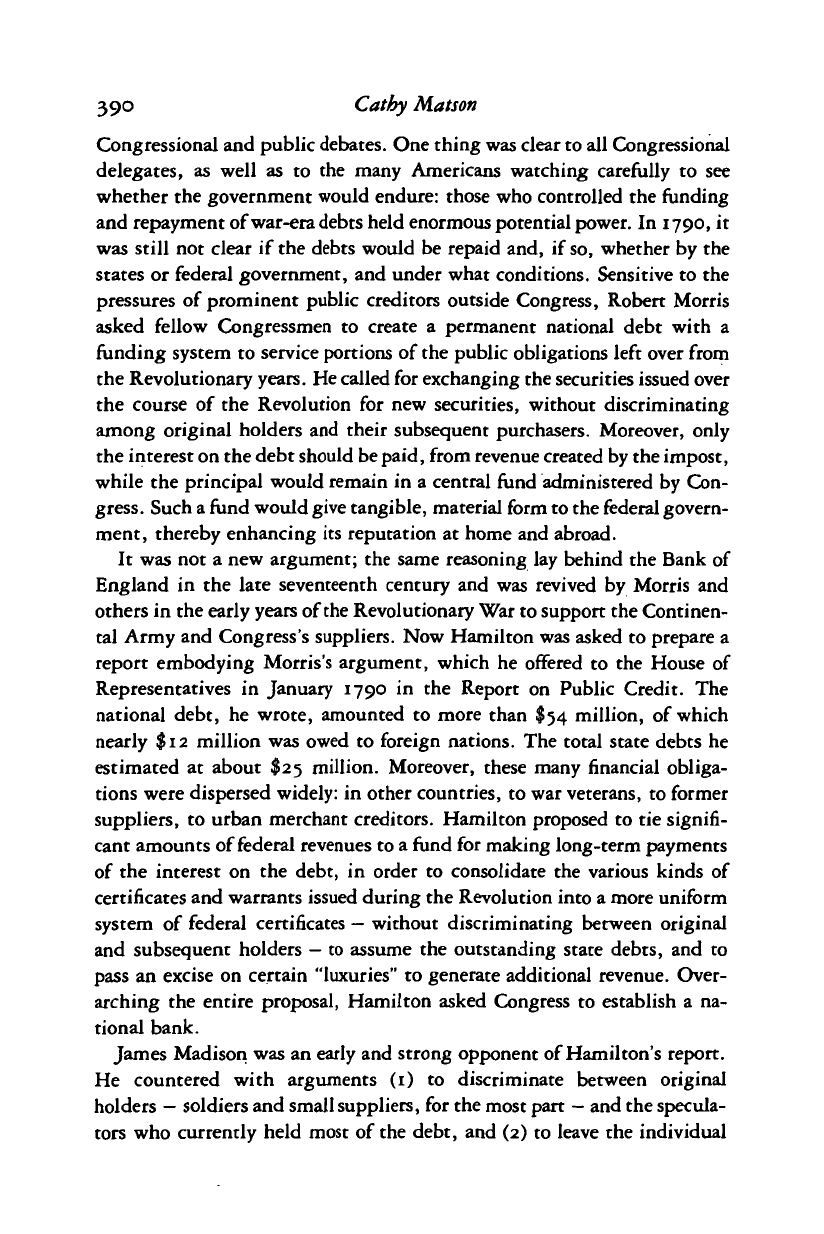
390 Cathy Matson
Congressional and public
debates.
One thing was clear to all Congressional
delegates, as well as to the many Americans watching carefully to see
whether the government would endure: those who controlled the funding
and repayment of war-era
debts
held enormous potential
power.
In 1790, it
was still not clear if the debts would be repaid and, if
so,
whether by the
states or federal government, and under what conditions. Sensitive to the
pressures of prominent public creditors outside Congress, Robert Morris
asked fellow Congressmen to create a permanent national debt with a
funding system to service portions of the public obligations left over from
the Revolutionary
years.
He
called for exchanging the securities issued over
the course of the Revolution for new securities, without discriminating
among original holders and their subsequent purchasers. Moreover, only
the interest on the debt should
be
paid,
from revenue created by the impost,
while the principal would remain in a central fund administered by Con-
gress.
Such
a
fund would
give
tangible, material form to the federal govern-
ment, thereby enhancing its reputation at home and abroad.
It was not a new argument; the same reasoning lay behind the Bank of
England in the late seventeenth century and was revived by Morris and
others in the early years of the Revolutionary War to support the Continen-
tal Army and Congress's suppliers. Now Hamilton was asked to prepare a
report embodying Morris's argument, which he offered to the House of
Representatives in January 1790 in the Report on Public Credit. The
national debt, he wrote, amounted to more than $54 million, of which
nearly $12 million was owed to foreign nations. The total state debts he
estimated at about $25 million. Moreover, these many financial obliga-
tions were dispersed widely: in other countries, to war veterans, to former
suppliers, to urban merchant creditors. Hamilton proposed to tie signifi-
cant amounts of federal revenues to a fund for making long-term payments
of the interest on the debt, in order to consolidate the various kinds of
certificates and warrants issued during the Revolution into a more uniform
system of federal certificates
—
without discriminating between original
and subsequent holders
—
to assume the outstanding state debts, and to
pass an excise on certain "luxuries" to generate additional revenue. Over-
arching the entire proposal, Hamilton asked Congress to establish a na-
tional bank.
James Madison was an early and strong opponent of Hamilton's report.
He countered with arguments (1) to discriminate between original
holders
—
soldiers and small
suppliers,
for the most part - and the specula-
tors who currently held most of the debt, and (2) to leave the individual
Cambridge Histories Online © Cambridge University Press, 2008
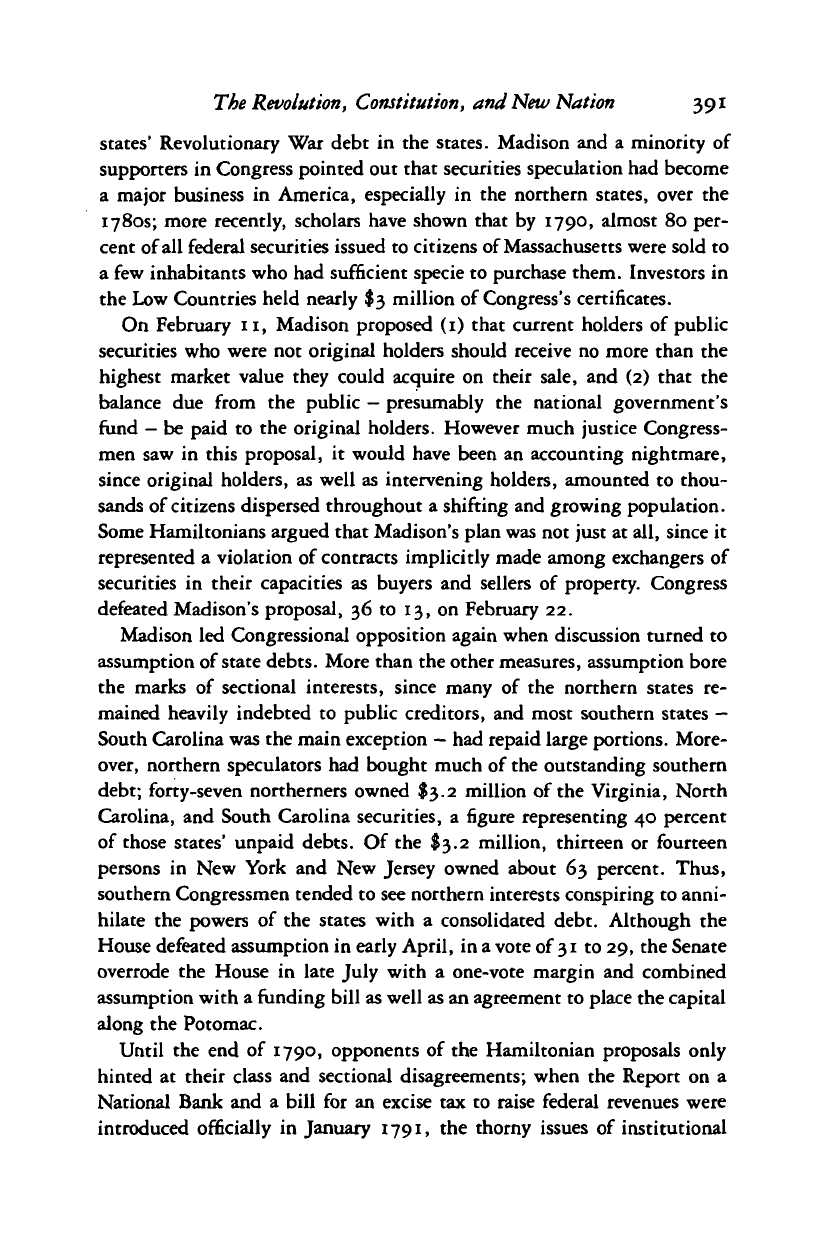
The
Revolution,
Constitution, and New Nation 391
states'
Revolutionary War debt in the states. Madison and a minority of
supporters in Congress pointed out that securities speculation had become
a major business in America, especially in the northern states, over the
1780s; more recently, scholars have shown that by 1790, almost 80 per-
cent of all federal securities issued to citizens of Massachusetts were sold to
a few inhabitants who had sufficient specie to purchase them. Investors in
the Low Countries held nearly $3 million of Congress's certificates.
On February n, Madison proposed (1) that current holders of public
securities who were not original holders should receive no more than the
highest market value they could acquire on their sale, and (2) that the
balance due from the public - presumably the national government's
fund - be paid to the original holders. However much justice Congress-
men saw in this proposal, it would have been an accounting nightmare,
since original holders, as well as intervening holders, amounted to thou-
sands of
citizens
dispersed throughout a shifting and growing population.
Some Hamiltonians argued that Madison's plan was not just at all, since it
represented a violation of contracts implicitly made among exchangers of
securities in their capacities as buyers and sellers of property. Congress
defeated Madison's proposal, 36 to 13, on February 22.
Madison led Congressional opposition again when discussion turned to
assumption of state debts. More than the other measures, assumption bore
the marks of sectional interests, since many of the northern states re-
mained heavily indebted to public creditors, and most southern states
—
South Carolina was the main exception - had repaid large portions. More-
over, northern speculators had bought much of the outstanding southern
debt; forty-seven northerners owned $3.2 million of the Virginia, North
Carolina, and South Carolina securities, a figure representing 40 percent
of those states' unpaid debts. Of the $3.2 million, thirteen or fourteen
persons in New York and New Jersey owned about 63 percent. Thus,
southern Congressmen tended to see northern interests conspiring to anni-
hilate the powers of the states with a consolidated debt. Although the
House defeated assumption in early April, in
a
vote of
31
to 29, the Senate
overrode the House in late July with a one-vote margin and combined
assumption with a funding bill as well as an agreement to place the capital
along the Potomac.
Until the end of 1790, opponents of the Hamiltonian proposals only
hinted at their class and sectional disagreements; when the Report on a
National Bank and a bill for an excise tax to raise federal revenues were
introduced officially in January 1791, the thorny issues of institutional
Cambridge Histories Online © Cambridge University Press, 2008
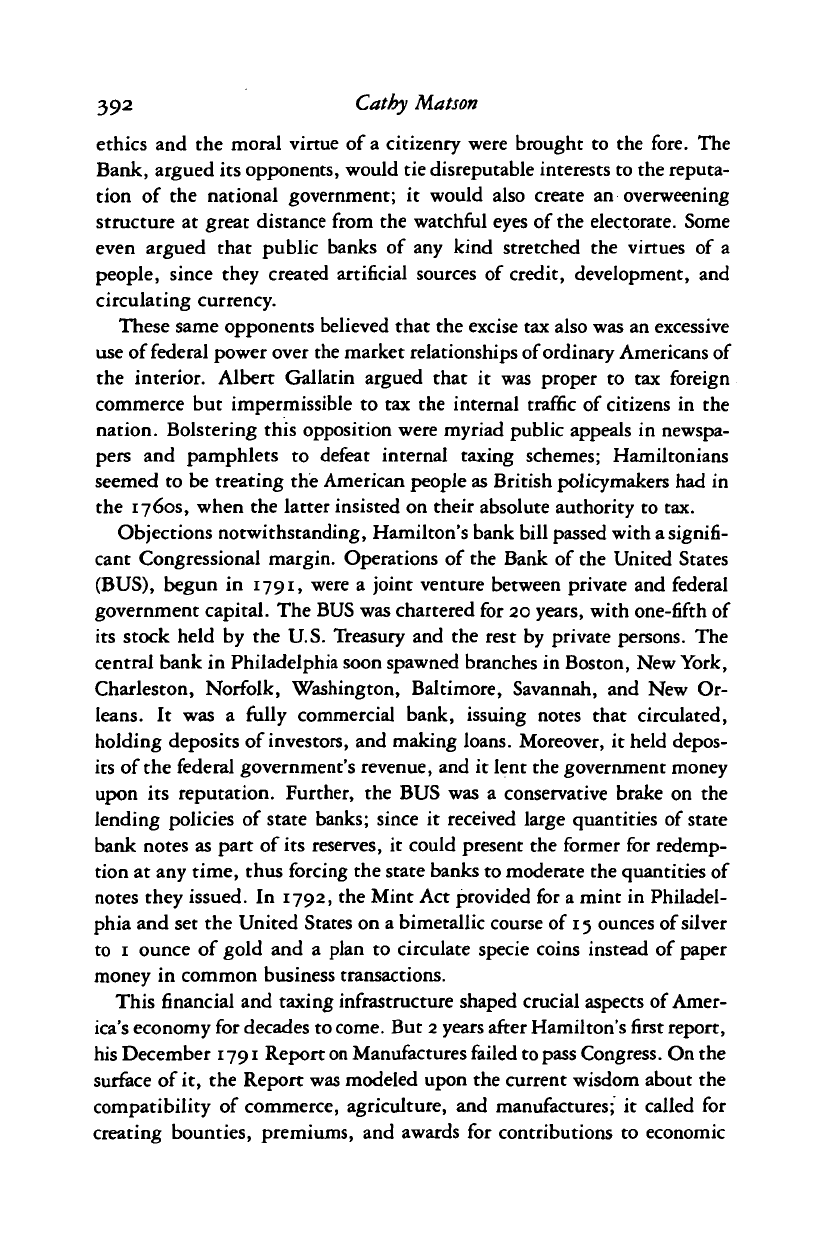
392 Cathy Matson
ethics and the moral virtue of a citizenry were brought to the fore. The
Bank, argued its opponents, would tie disreputable interests to the reputa-
tion of the national government; it would also create an overweening
structure at great distance from the watchful eyes of the electorate. Some
even argued that public banks of any kind stretched the virtues of a
people, since they created artificial sources of credit, development, and
circulating currency.
These same opponents believed that the excise tax also was an excessive
use of federal power over the market relationships of ordinary Americans of
the interior. Albert Gallatin argued that it was proper to tax foreign
commerce but impermissible to tax the internal traffic of citizens in the
nation. Bolstering this opposition were myriad public appeals in newspa-
pers and pamphlets to defeat internal taxing schemes; Hamilronians
seemed to be treating the American people as British policymakers had in
the 1760s, when the latter insisted on their absolute authority to tax.
Objections notwithstanding, Hamilton's bank bill passed with
a
signifi-
cant Congressional margin. Operations of the Bank of the United States
(BUS),
begun in 1791, were a joint venture between private and federal
government capital. The BUS was chartered for 20 years, with one-fifth of
its stock held by the U.S. Treasury and the rest by private persons. The
central bank in Philadelphia soon spawned branches in Boston, New York,
Charleston, Norfolk, Washington, Baltimore, Savannah, and New Or-
leans.
It was a fully commercial bank, issuing notes that circulated,
holding deposits of
investors,
and making loans. Moreover, it held depos-
its of the federal government's revenue, and it lent the government money
upon its reputation. Further, the BUS was a conservative brake on the
lending policies of state banks; since it received large quantities of state
bank notes as part of its reserves, it could present the former for redemp-
tion at any time, thus forcing the state banks to moderate the quantities of
notes they issued. In 1792, the Mint Act provided for a mint in Philadel-
phia and set the United States on a bimetallic course of 15 ounces of silver
to 1 ounce of gold and a plan to circulate specie coins instead of paper
money in common business transactions.
This financial and taxing infrastructure shaped crucial aspects of Amer-
ica's economy for decades to
come.
But
2
years after Hamilton's first report,
his December 1791 Report
on
Manufactures failed
to pass
Congress.
On the
surface of it, the Report was modeled upon the current wisdom about the
compatibility of commerce, agriculture, and manufactures; it called for
creating bounties, premiums, and awards for contributions to economic
Cambridge Histories Online © Cambridge University Press, 2008
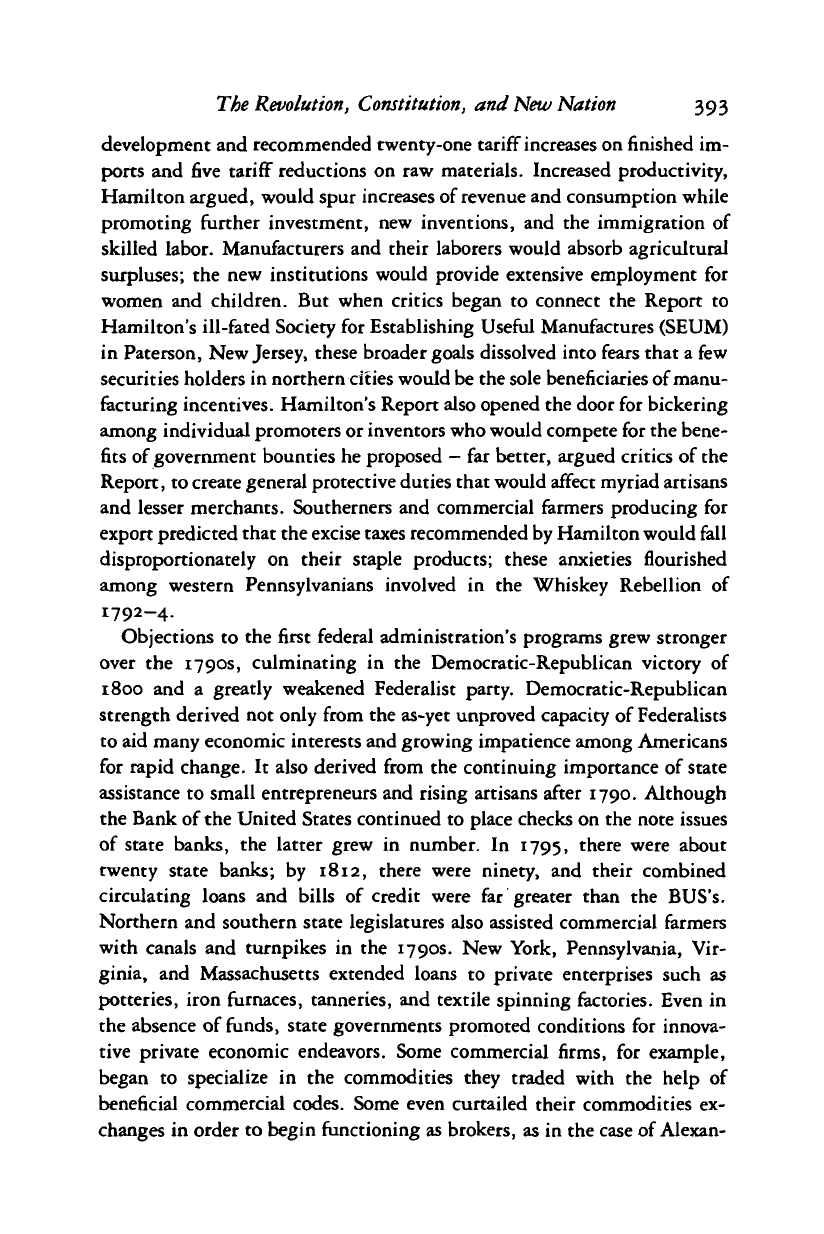
The
Revolution,
Constitution,
and New Nation 393
development and recommended twenty-one tariff increases on finished im-
ports and five tariff reductions on raw materials. Increased productivity,
Hamilton argued, would spur increases of revenue and consumption while
promoting further investment, new inventions, and the immigration of
skilled labor. Manufacturers and their laborers would absorb agricultural
surpluses; the new institutions would provide extensive employment for
women and children. But when critics began to connect the Report to
Hamilton's ill-fated Society for Establishing Useful Manufactures (SEUM)
in Paterson, New
Jersey,
these broader goals dissolved into fears that a few
securities holders in northern cities would be the sole beneficiaries of manu-
facturing incentives. Hamilton's Report also opened the door for bickering
among individual promoters or inventors who would compete for the bene-
fits of government bounties he proposed - far better, argued critics of the
Report, to create general protective duties that would affect myriad artisans
and lesser merchants. Southerners and commercial farmers producing for
export predicted that the
excise
taxes recommended by Hamilton would fall
disproportionately on their staple products; these anxieties flourished
among western Pennsylvanians involved in the Whiskey Rebellion of
1792-4.
Objections to the first federal administration's programs grew stronger
over the 1790s, culminating in the Democratic-Republican victory of
1800 and a greatly weakened Federalist party. Democratic-Republican
strength derived not only from the as-yet unproved capacity of Federalists
to aid many economic interests and growing impatience among Americans
for rapid change. It also derived from the continuing importance of state
assistance to small entrepreneurs and rising artisans after 1790. Although
the Bank of the United States continued to place checks on the note issues
of state banks, the latter grew in number. In 1795, there were about
twenty state banks; by 1812, there were ninety, and their combined
circulating loans and bills of credit were far greater than the BUS's.
Northern and southern state legislatures also assisted commercial farmers
with canals and turnpikes in the 1790s. New York, Pennsylvania, Vir-
ginia, and Massachusetts extended loans to private enterprises such as
potteries, iron furnaces, tanneries, and textile spinning factories. Even in
the absence of funds, state governments promoted conditions for innova-
tive private economic endeavors. Some commercial firms, for example,
began to specialize in the commodities they traded with the help of
beneficial commercial codes. Some even curtailed their commodities ex-
changes in order to begin functioning as brokers, as in the case of Alexan-
Cambridge Histories Online © Cambridge University Press, 2008
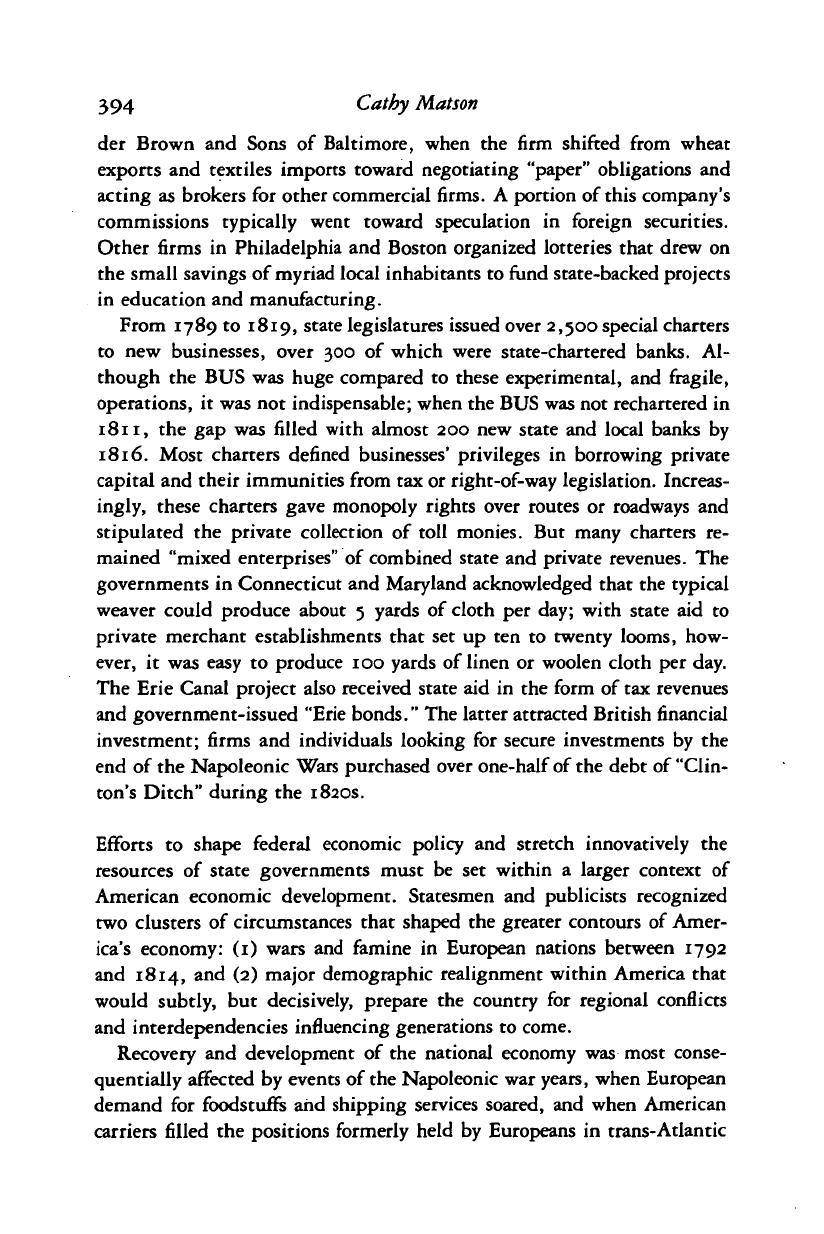
394 Cathy Matson
der Brown and Sons of Baltimore, when the firm shifted from wheat
exports and textiles imports toward negotiating "paper" obligations and
acting as brokers for other commercial firms. A portion of this company's
commissions typically went toward speculation in foreign securities.
Other firms in Philadelphia and Boston organized lotteries that drew on
the small savings of myriad local inhabitants to fund state-backed projects
in education and manufacturing.
From 1789 to 1819, state legislatures issued over 2,500 special charters
to new businesses, over 300 of which were state-chartered banks. Al-
though the BUS was huge compared to these experimental, and fragile,
operations, it was not indispensable; when the BUS was not rechartered in
1811,
the gap was filled with almost 200 new state and local banks by
1816.
Most charters defined businesses' privileges in borrowing private
capital and their immunities from tax or right-of-way legislation. Increas-
ingly, these charters gave monopoly rights over routes or roadways and
stipulated the private collection of toll monies. But many charters re-
mained "mixed enterprises" of combined state and private revenues. The
governments in Connecticut and Maryland acknowledged that the typical
weaver could produce about 5 yards of cloth per day; with state aid to
private merchant establishments that set up ten to twenty looms, how-
ever, it was easy to produce 100 yards of linen or woolen cloth per day.
The Erie Canal project also received state aid in the form of tax revenues
and government-issued "Erie bonds." The latter attracted British financial
investment; firms and individuals looking for secure investments by the
end of the Napoleonic Wars purchased over one-half of the debt of "Clin-
ton's Ditch" during the 1820s.
Efforts to shape federal economic policy and stretch innovatively the
resources of state governments must be set within a larger context of
American economic development. Statesmen and publicists recognized
two clusters of circumstances that shaped the greater contours of Amer-
ica's economy: (1) wars and famine in European nations between 1792
and 1814, and (2) major demographic realignment within America that
would subtly, but decisively, prepare the country for regional conflicts
and interdependencies influencing generations to come.
Recovery and development of the national economy was most conse-
quentially affected by events of the Napoleonic war years, when European
demand for foodstuffs and shipping services soared, and when American
carriers filled the positions formerly held by Europeans in trans-Atlantic
Cambridge Histories Online © Cambridge University Press, 2008
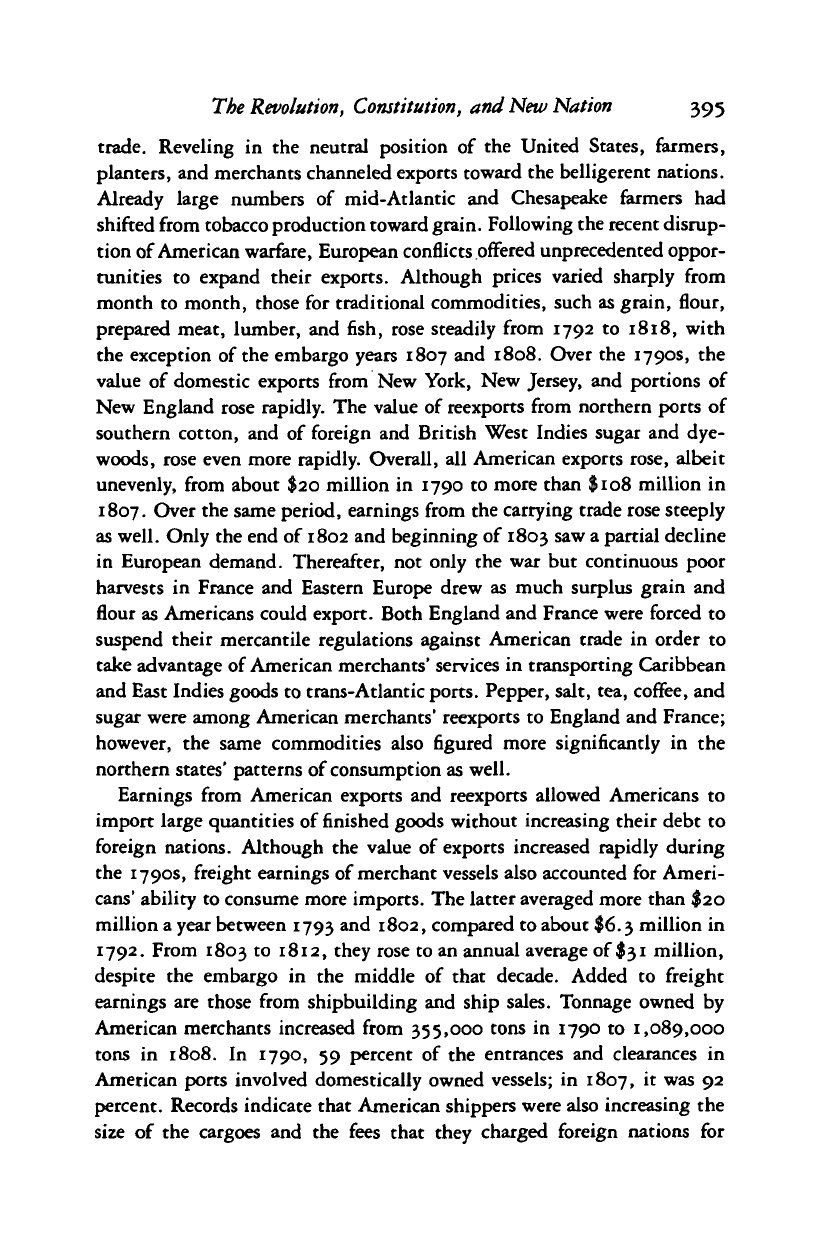
The
Revolution,
Constitution,
and New Nation 395
trade. Reveling in the neutral position of the United States, formers,
planters, and merchants channeled exports toward the belligerent nations.
Already large numbers of mid-Atlantic and Chesapeake farmers had
shifted from
tobacco
production toward
grain.
Following the recent disrup-
tion of American warfare, European conflicts offered unprecedented oppor-
tunities to expand their exports. Although prices varied sharply from
month to month, those for traditional commodities, such as grain, flour,
prepared meat, lumber, and fish, rose steadily from 1792 to 1818, with
the exception of the embargo years 1807 and 1808. Over the 1790s, the
value of domestic exports from New York, New Jersey, and portions of
New England rose rapidly. The value of reexports from northern ports of
southern cotton, and of foreign and British West Indies sugar and dye-
woods, rose even more rapidly. Overall, all American exports rose, albeit
unevenly, from about $20 million in 1790 to more than $108 million in
1807.
Over the same period, earnings from the carrying trade rose steeply
as well. Only the end of 1802 and beginning of 1803 saw a partial decline
in European demand. Thereafter, not only the war but continuous poor
harvests in France and Eastern Europe drew as much surplus grain and
flour as Americans could export. Both England and France were forced to
suspend their mercantile regulations against American trade in order to
take advantage of American merchants' services in transporting Caribbean
and East Indies goods to trans-Atlantic ports. Pepper, salt, tea, coffee, and
sugar were among American merchants' reexports to England and France;
however, the same commodities also figured more significantly in the
northern states' patterns of consumption as well.
Earnings from American exports and reexports allowed Americans to
import large quantities of finished goods without increasing their debt to
foreign nations. Although the value of exports increased rapidly during
the 1790s, freight earnings of merchant vessels also accounted for Ameri-
cans'
ability to consume more imports. The latter averaged more than $20
million a year between 1793 and 1802, compared to about $6.3 million in
1792.
From 1803 to 1812, they rose to an annual average of
$31
million,
despite the embargo in the middle of that decade. Added to freight
earnings are those from shipbuilding and ship sales. Tonnage owned by
American merchants increased from 355,000 tons in 1790 to
1,089,000
tons in 1808. In 1790, 59 percent of the entrances and clearances in
American ports involved domestically owned vessels; in 1807, it was 92
percent. Records indicate that American shippers were also increasing the
size of the cargoes and the fees that they charged foreign nations for
Cambridge Histories Online © Cambridge University Press, 2008
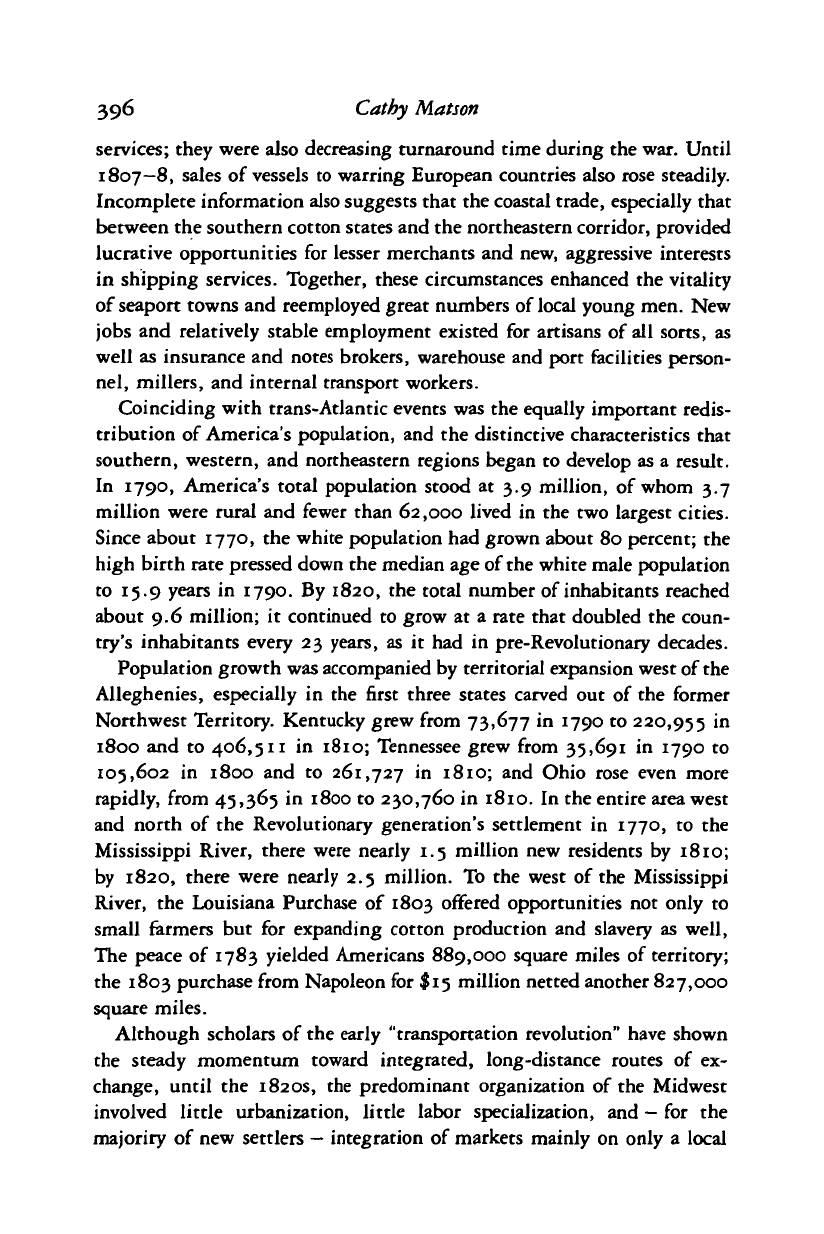
396 Cathy Matson
services; they were also decreasing turnaround time during the war. Until
1807—8,
sales of vessels to warring European countries also rose steadily.
Incomplete information
also
suggests that the coastal trade, especially that
between the southern cotton states and the northeastern corridor, provided
lucrative opportunities for lesser merchants and new, aggressive interests
in shipping services. Together, these circumstances enhanced the vitality
of seaport towns and reemployed great numbers of
local
young men. New
jobs and relatively stable employment existed for artisans of all sorts, as
well as insurance and notes brokers, warehouse and port facilities person-
nel,
millers, and internal transport workers.
Coinciding with trans-Atlantic events was the equally important redis-
tribution of America's population, and the distinctive characteristics that
southern, western, and northeastern regions began to develop as a result.
In 1790, America's total population stood at 3.9 million, of whom 3.7
million were rural and fewer than 62,000 lived in the two largest cities.
Since about 1770, the white population had grown about 80 percent; the
high birth rate pressed down the median age of the white male population
to 15.9 years in 1790. By 1820, the total number of inhabitants reached
about 9.6 million; it continued to grow at a rate that doubled the coun-
try's inhabitants every 23 years, as it had in pre-Revolutionary decades.
Population growth was accompanied by territorial expansion west of the
Alleghenies, especially in the first three states carved out of the former
Northwest Territory. Kentucky grew from 73,677 in 1790 to 220,955 in
1800 and to 406,511 in 1810; Tennessee grew from 35,691 in 1790 to
105,602 in 1800 and to 261,727 in 1810; and Ohio rose even more
rapidly, from 45,365 in 1800 to 230,760 in 1810. In the entire area west
and north of the Revolutionary generation's settlement in 1770, to the
Mississippi River, there were nearly 1.5 million new residents by 1810;
by 1820, there were nearly 2.5 million. To the west of the Mississippi
River, the Louisiana Purchase of 1803 offered opportunities not only to
small farmers but for expanding cotton production and slavery as well,
The peace of 1783 yielded Americans 889,000 square miles of territory;
the 1803 purchase from Napoleon for $15 million netted another 827,000
square miles.
Although scholars of the early "transportation revolution" have shown
the steady momentum toward integrated, long-distance routes of ex-
change, until the 1820s, the predominant organization of the Midwest
involved little urbanization, little labor specialization, and
—
for the
majority of new settlers
—
integration of markets mainly on only a local
Cambridge Histories Online © Cambridge University Press, 2008
